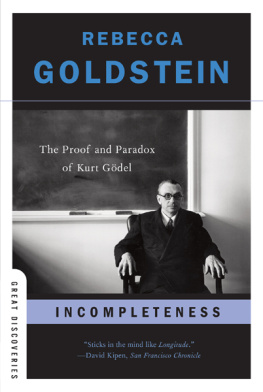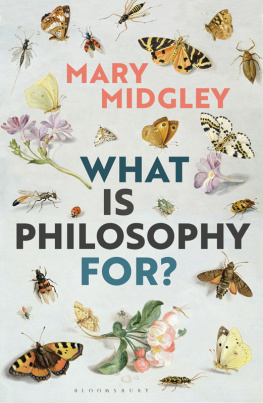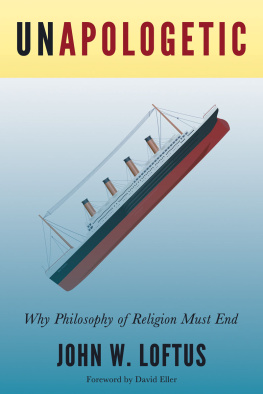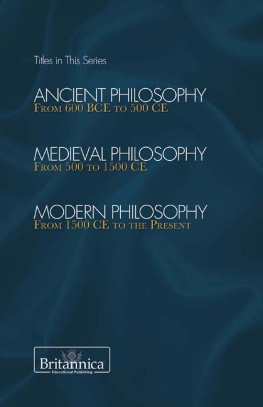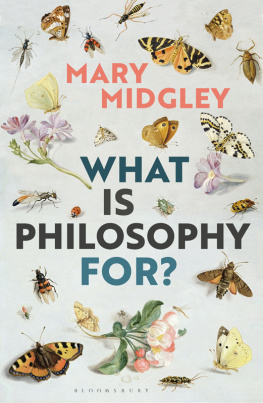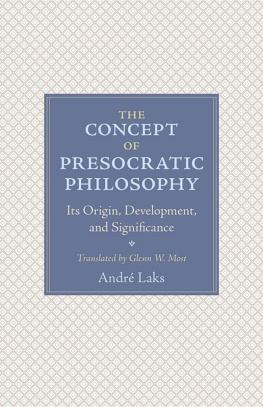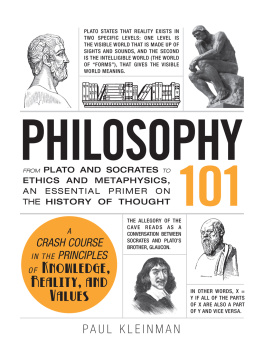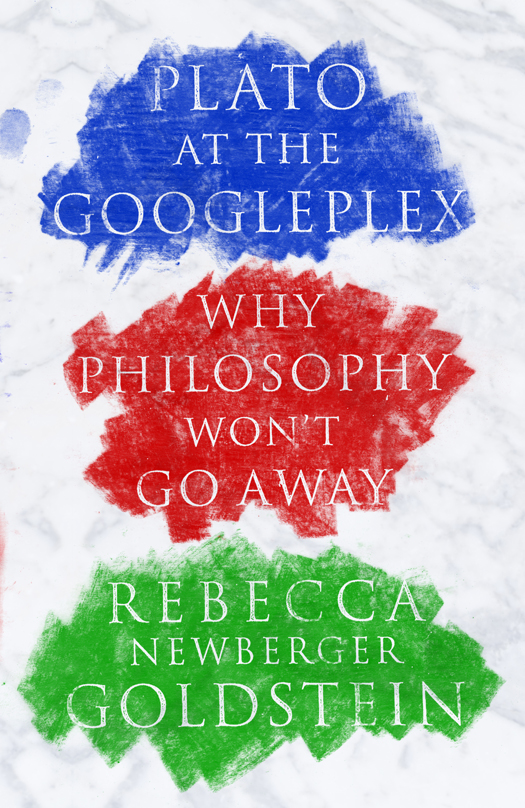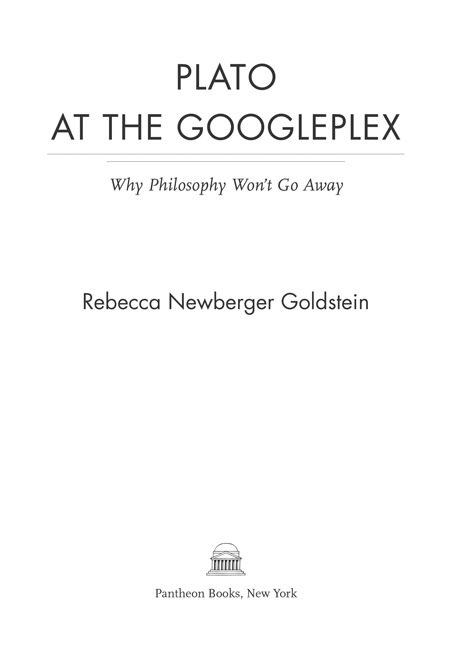Copyright 2014 by Rebecca Goldstein
All rights reserved. Published in the United States by Pantheon Books, a division of Random House LLC, New York, and in Canada by Random House of Canada Limited, Toronto, Penguin Random House companies.
Pantheon Books and colophon are registered trademarks of Random House LLC.
Owing to limitations of space, permissions to reprint from previously published material are listed following the bibliographical note.
Library of Congress Cataloging-in-Publication Data
Goldstein, Rebecca, [date]
Plato at the Googleplex : why philosophy wont go away / Rebecca Goldstein.
pages cm
Includes bibliographical references.
HC ISBN 978-0-307-37819-4 EBK ISBN 978-0-307-90887-2
1. PlatoInfluence. 2. PhilosophyHistory21st century.
3. Imaginary conversations. I. Title.
B 395. G 4435 2014 184dc23 2013029660
www.pantheonbooks.com
Jacket design by Pablo Delcn
v3.1
FOR HARRY AND ROZ PINKER
CONTENTS
PROLOGUE
A book devoted to a particular thinker often presumes that thinker got everything right. I dont think this is true of Plato. Plato got about as much wrong as we would expect from a philosopher who lived 2,400 years ago. Were this not the case, then philosophy, advancing our knowledge not at all, would be useless. I dont think its useless, so Im quite happy to acknowledge how mistaken or confused Plato can often strike us.
Plato is surprisingly relevant to many of our contemporary discussions, but this isnt because he knew as much as we do. Obviously, he didnt know the science that we know. But, less obviously, he didnt know the philosophy that we know, including philosophy that has filtered outward beyond the seminar table. Conclusions that philosophers first establish by way of tortuous reasoning have a way, over time, of leaking into shared knowledge. Such leakage is perhaps more common as regards the questions of morality than other branches of philosophy, since those are questions that constantly test us. We can hardly get through our livesin fact, its hard to get through a weekwithout considering what makes specific actions right and others wrong and debating with ourselves whether that is a difference that must compel the actions we choose. (Okay, its wrong! I get it! But why should I care?)
Platos ruminations, as profound as they are, hardly give us the last word on such matters. European thinkers of the Age of Reason and the Plato now without occasional disapproval. Its precisely because he initiated a process that has taken us beyond him.
So Plato hardly did all the philosophical work. And yet he did do something so extraordinary as to mark his thinking as one of the pivotal stages in humankinds development. What Plato did was to carve out the field of philosophy itself. It was Plato who first framed the majority of fundamental philosophical questions. He grasped the essence of a peculiar kind of question, the philosophical question, some specimens of which were already afloat in the Athens of his day, and he extended its application. He applied the philosophical question not only to norms of human behavior, as Socrates had done, but to language, to politics, to art, to mathematics, to religion, to love and friendship, to the mind, to personal identity, to the meaning of life and the meaning of death, to the natures of explanation, of rationality, and of knowledge itself. Philosophical questions could be framed in all these far-flung areas of human concern and inquiry, and Plato framed them, often in their definitive form. How did he do it? Why was it he who did it? This is a mystery Ive always wanted to unravel. But how do you get close enough to Plato to even attempt to figure him out? Drawing conclusions about which doctrines he meant to assertor even whether he meant to assert any doctrines at allis difficult enough, much less hoping to get a glimpse into the soul of the man.
Though Plato is (at least for many of us) an easy philosopher to love, he is also a deucedly difficult philosopher to get close to. Despite his enormous influence, he is one of the most remote figures in the history of thought. His remoteness is not only a matter of his antiquity, but also of the manner in which he gave himself to us by way of his writings. He didnt create treatises, essays, or inquiries that propound positions. Instead, he wrote dialogues, which are not only great works of philosophy but also great works of literature.
His language is that of a consummate artist. Classical scholars affirm that his It is almost as naive to reduce the dialogic Socrates to a mere sock puppet for the philosopher Plato as it is to reduce Plato to a mere notetaker for the philosopher Socrates. Plato floats fugitive between these two reductions.
His elusiveness is comparable to that of another protean writer of whom it is difficult to catch a glimpse through the genius of the work, characterizations that have been foisted upon him.
It has been claimed that Plato was an egalitarian; it has been claimed that he was a totalitarian. It has been claimed that he was a utopian, proposing a universal blueprint for the ideal state; it has been claimed he was an anti-utopian, demonstrating that all political idealism is folly. It has been claimed he was a populist, concerned with the best interests of all citizens; it has been claimed he was an elitist with disturbing eugenicist tendencies. It has been claimed he was other-worldly; it has been claimed he was this-worldly. It has been claimed he was a romantic; it has been claimed he was a prig. It has been claimed that he was a theorizer, with sweeping metaphysical doctrines; it has been claimed he was an anti-theorizing skeptic, always intent on unsettling convictions. It has been claimed he was full of humor and play; it has been claimed he was as solemn as a sermon limning the torments of the damned. It has been claimed he loved his fellow man; it has been claimed he loathed his fellow man. It has been claimed he was a philosopher who used his artistic gifts in the service of philosophy; it has been claimed he was an artist who used philosophy in the service of his art.
Isnt it curious that a figure can exert so much influence throughout the course of Western civilization and escape consensus as to what he was all about? And how in the world can one hope to draw closer to so elusive a figure?
He was an ancient Greek, a citizen of the city-state of Athens during its classical age. How much of Platos achievement in almost singlehandedly creating philosophy is explained by his having been a Greek? The Greeks have fascinated us for a good long while now. Even the Romans, who vanquished them militarily, were vanquished from within by the fascinating Greeks. After the millennia of obsession, is there anything new to say about them? I think so, and it is this: the preconditions for philosophy were created there in ancient Greece, and most especially in Athens. These preconditions lay not only in a preoccupation with the question of what it is that makes life worth living but in a distinctive approach to this question.
The Greeks were not alone in being preoccupied with the question of human worth and human mattering. Across the Mediterranean was the still-obscure tribe called the Ivrim, the Hebrews, from the word for over, since they were over on the other side of the Jordan. There they worked out their notion of a covenantal relationship with a tribal god whom they eventually elevated to the position of the one and only God, The Master of the Universe who provides the foundation for both the physical world without and the moral world within. To live according to his commandments was to live a life worth living. Our Western culture is still an uneasy mix of the approaches to the question of human worth worked out by these two Mediterranean peoples, the Greeks and the Hebrews. But even they werent alone in their existential preoccupations. In Persia, Zoroastrianism presented a dualistic version of the forces of good and evil; in China, there was Confucius and Lao Tzu and Chuang Tzu; and in India, there was the Buddha. Each of these approaches adds to the range of choices we have for conceiving the life worth living.




